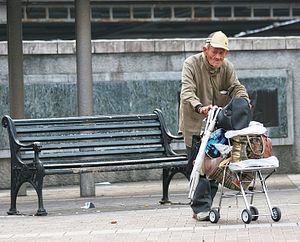NPR reported on a fascinating phenomenon in Japanese society that has been increasingly discussed in recent years: senior citizens in Japan are committing crimes at increasing rates. The rate at which Japanese senior citizens over the age of 65 have been arrested for mostly petty crimes has grown from 80 per 100,000 residents from 1995 to 2005 to a rate of 162 per 100,000 residents in the decade ending in 2015, the report notes. 59 percent of these crimes, per 2012 data from Japan’s National Police Agency, involved shoplifting.
Of course, given Japan’s overall demographic picture as one of the oldest countries in the world, aging faster with a declining birthrate, the proportion of the country as a whole that is over 65 has grown during the same time.
There’s an interesting economic story embedded in this odd trend of increasing crime rates among the elderly in Japan — a country not known for being especially prone to criminal activity. As the article notes, there are several possible explanations for why this phenomenon is occurring.
One expert who spoke to NPR, Yuki Shinko, notes that the cause may have to do with unproductive retirees feeling “isolated and bored,” unleashing their energy and creativity in ways that don’t always comport with the law.
A private security contractor who spoke to NPR speculates that the phenomenon is due to older social mores among Japan’s elderly, who “were brought up during and after the war, and they had to survive, and they have less conscience, they feel less guilty.”
Back in 2013, Bloomberg noted a darker impulse at play. Given inadequate social security provisions, many seniors simply hope to be arrested for petty crimes to receive food and housing.
The latter explanation strikes me as less convincing in this case. Shinko’s hypothesis seems more credible and comports with broader labor market realities in Japan. Elderly people continue to work well into their 80s and sometimes their 90s and beyond. Private companies have responded by increasing retirement ages. Meanwhile, Japan’s official retirement age, standing today at 62, is poised to increase to 65 by 2025. (The plan is to gradually increase the age by one year every three years.)
Meanwhile, despite the bleak demographic picture and rapid aging, Japan has one of the lowest unemployment rates in the developed world. The seasonally adjusted unemployment rate stood at 3.0 percent this summer, effectively representing full employment. (As I discussed last year, the shrinking total labor force size is at the root of many of Japan’s macroeconomic woes, despite encouraging employment numbers.)
Despite these encouraging labor force participation trends, Japan has long struggled with productivity and, as a result, overall economic growth. Prime Minister Shinzo Abe’s three-pronged “Abenomics” set of fiscal, monetary, and structural reforms have sought to address this in a variety of ways, including by encouraging women’s participation in the labor force and encouraging Japanese corporations to reform their working culture.
The elderly aren’t the obvious place to look for a solution to Japan’s long-standing laggard productivity and growth problems, of course. While the increasing criminality and labor participation rates among Japanese older than 65 is suggestive of productive impulses, it’s also true that many Japanese would simply prefer to retire and enjoy their golden years.
But given that Japanese statistics show that 40 percent of the country will be senior citizens by 2060, encouraging older Japanese who are willing to work and have the creative and productive energy necessary to participate in the labor force will be critical.
Not only would this help potentially eke out additional productivity from otherwise non-productive workers (some of who are seemingly turning to petty crime!), but it could also lessen the burden on Japan’s buckling pension system, which has become a hot-button political issue.
Moreover, the cases of seniors hoping to be sent to jail so they can receive food and housing without financial burden underscores a broader need for addressing economic self-sufficiency for Japan’s elderly. (Especially for those without a family capable of supporting them otherwise.)
This is far from a silver bullet to Japan’s complex demographic and accompanying economic problems, but if the country is to defy what appears to be a bleak demographic destiny barring immigration liberalization, it’ll need all the help it can get.

































